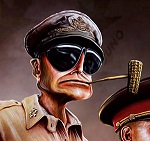|
Current reading - begin Post Captain, read to page 197 (chapter 7) by Monday 3/14. Ahoy there, fellow goons! The weather is getting warm, I’ve finished my winter pile of books to read, and I’m in the mood for a good sea-story – so I’m going to read, for the first time, Patrick O’Brian’s Aubrey-Maturin novels.  Who? What? Starting in 1969, Patrick O’Brian wrote a sequence of 20 books (plus another unfinished, published posthumously) about the adventures of Captain Jack Aubrey and his ship’s surgeon, Stephen Maturin, who are both members of the British Navy during the Napoleonic Wars. Most of the books were bestsellers, and many critics regard the series as the best historical novels ever written. Richard Snow, New York Times Book Review posted:…O'Brian reconstructs a civilization. The Royal Navy at the beginning of the 19th century was a world of extraordinary breadth and complexity. Its hundreds of ships, the larger of them regular floating cities with close-packed populations of 1,200 souls, allowed Britain first to survive and then to prevail in a struggle whose cost and size would have been unimaginable only a generation earlier. These sailing ships -- today reduced to quaint and soothing images on wall calendars -- were in their time the most complicated machines on earth, and the deadliest. Why are you doing this? I’ve always wanted to read these – the subject matter is fascinating, though as a product of the American public school system, I know next to nothing about nautical history or the Napoleonic wars – and I’ve tried reading the first book, Master and Commander, a few times before, but have given up halfway through from a combination of a too-busy schedule and the fact that this series is very jargon-heavy. I’ve been told that it works like a full-immersion language program – don’t worry about what you don’t understand until you find that you understand it – so I’ll give that a try this time around. How will this work? I’m hoping to read 200-300 pages a week, which will amount to one book every ten days or so. I’ll adjust the pace as needed. Hopefully we’ll get a bunch of people reading along, so I won’t be the only one talking about what I’ve read. BIG IMPORTANT NOTE: I’ve never read these books before. Don’t spoil them for me or anyone else. Re-readers are more than welcome to join, but please don’t discuss what happens until we’ve gotten there as a group. So. The first book in the series is 1969’s Master and Commander.  Your library probably has it, as well as your local bookstore and Amazon. If you prefer to listen to your literature, the audiobooks of the series are top-notch. I plan on reaching page 244 (the beginning of Chapter Eight) by Friday. See you then. Happy sailing! master mystifier fucked around with this message at 14:10 on Mar 9, 2011 |
|
|
|

|
| # ? Apr 19, 2024 00:44 |
|
Supplemental I’ll also be talking about the background of the novels – the historical context, the technology, the wildlife, as well as any outside literary criticism or commentary I come across. I’ve obtained a copy of A Sea of Words, a reference book by Dean King et al. that explains everything from how a kidney stone was removed to where the mizzen topgallant staysail was. There will be lots of things to talk about, and I hope that people who know more about European naval history than I do (e.g. anyone) will chime in and help us understand. Here’s the entire piece I quoted in the OP, an appreciation of the series in the NYT Book Review by Richard Snow: http://www.nytimes.com/books/98/10/18/specials/obrian-plank.html (There will be lots more added later)
|
|
|
|
You're in for a Gi-nourmous treat. These are, imho, arguably the best novels of historical fiction ever written (I insert the "arguably" only because of Mary Renault's works). One word of warning: I took me two or three "tries" -- in the sense of complete read-throughs -- to really get synced into and fully enjoy the series. He uses so many period nautical and medical words that reading these books is almost like learning a new language -- extremely rewarding once you've done it, but a great deal of work in the meanwhile. I agree completely with the "immersion program" approach -- don't worry too much about understanding, just "bleep" over the parts you don't know and keep reading, and eventually you'll get the gestalt. Sea of Words is useful, especially because some of the words O'Brian used were so rare that they aren't going to be in any standard dictionary -- sometimes, not even in the OED -- but not strictly *necessary* as long as you're willing to just roll with not understanding everything for a while. As an example, quote:An interview with Patrick O'Brian published in The Patrick O'Brian Newsletter (volume 3, issue 1, March 1994) contains this Q & A: You can get the complete boxed set of all the Aubrey/Maturin novels, including the unfinished "21", here: http://www.amazon.com/Complete-Aubrey-Maturin-Novels/dp/039306011X/ref=sr_1_1?ie=UTF8&s=books&qid=1298920452&sr=1-1 It's worth it, though the paper's a little thin and the text a little smaller than in the standard paperbacks, so sometimes you need to make sure you have good light to read them in. For everyone who isn't sold already -- To add a little to the OP's description of the books, the basic "engine" that drives the series is the relationship between Captain Jack Aubrey (loosely based on the real-life Lord Cochrane) and Dr. Stephen Maturin, his friend and ship's doctor. Aubrey is a genius of a combat ship's captain, but an absolute shambles ashore, inept at politics and finance and all the other ways good people can get themselves in trouble; Maturin is a genius doctor but helpless at sea. Really can't be recommended strongly enough. Hieronymous Alloy fucked around with this message at 21:17 on Feb 28, 2011 |
|
|
|
|
I really enjoy this series not only for the nautical period fiction, but because the relationship between Aubrey and Maturin was so enjoyable to read. The more books I read the more I envied their camaraderie and it kept me in the series far longer than pure genre fiction would have. I don't remember if I read it somewhere else, but it seems that the author was often casting himself as Maturin and probing his own self-doubts about friendship and his ability to have it and be worthy of it. It added an interesting depth and character contrast that made the series memorable to me. Anyways, that's probably all nonsense. Read the books, you'll love 'em. 21 was kind of emotional for me though, just because drops from rough draft to draft notes mid-stream...it was too sad and I couldn't get through it. Edit: Hiero -- you might want to edit out almost all your description of Maturin at the end of your post because it doesn't come to light until farther along in M&C Campbell fucked around with this message at 21:12 on Feb 28, 2011 |
|
|
Campbell posted:
Yeah, good point, apologies; I wasn't thinking about that as a spoiler because it comes to light so early on in the series, but I guess it is a bit of a surprise in the first book.
|
|
|
|
|
I have read 19 out of 20 of these books. The 20th I was 2/3rds through when I forgot it on an airplane. I've taken that as a sign that I'm not ready to finish the series because I love it too much. So I guess all that's left now is hoping they decide to make another movie. Enjoy the read-through, it's some of the very best historical fiction that will ever be written.
|
|
|
|
I own books 1 and 2 so I'll at least read those with you! I'll look for library copies of the rest near me.
|
|
|
|
I think the best compliment I could give the series would be that if I could travel back in time to the early to mid-19th century, I could take one of these novels along and the British people I'd encounter would still really it. The writing just feels so... authentic. None of the characters feel like 20th century people written into the story - they belong to their era. Also, I love how excited Jack gets about all things Maritime in the books. Things like 6 page long letters to his wife, with four of them being detailed things about rigging or ship's trim; the sort of thing that obviously sailors would care about, but no one on land would understand in the slightest.
|
|
|
|
OP, I think that you've made a great choice in reading material. It's very interesting what O'Brian notes in the foreword of M&C(I think, I'm away from home atm), how the actions and ships described are closely modeled on real ones that he learned about via various Royal Navy and other maritime-related sources.
|
|
|
|
Hear, hear! An excellent endeavor with the best series of books. It took me forever to pick up book 19 because I never wanted to finish the series. At the end of 20 (or 21), you'll wish you read more slowly. Another reference book that I enjoyed was Harbors and High Seas (http://www.amazon.com/Harbors-High-Seas-3rd-Aubrey-Maturin/dp/0805066144), but be warned, there are a million spoilers in there. And only pick up The Patrick O'Brian Muster Book (http://www.amazon.com/Patrick-OBrian-Muster-Book-Aubrey-Maturin/dp/0786424826) after you've finished the series; it's very upsetting to read about your favorite character only to learn they die later on. All the best and when in doubt, always choose the lesser of two weevils.
|
|
|
|
I recently added M&C to my Kindle, but couldn't decide where to put it in my ridiculous queue of books. You have inspired me, goonsir. Let's read.
|
|
|
|
I actually just finished book one about an hour ago. I had tried reading it a few years and couldn't get past the language but I was much more successful this time since I caught all the humor and racy bits I didn't pick up on last time. Definitely looking forward to reading more.
|
|
|
|
I always come to the Book Barn hoping for a new Aubrey/Maturin thread/ They really are the best books in the world. And funny. O'Brian is frickin' hilarious. David Mamet wrote an article about O'Brian that I've always enjoyed. http://www.nytimes.com/2000/01/17/books/the-humble-genre-novel-sometimes-full-of-genius.html?ref=patrickobrian Warning though, it has spoilers so if you haven't read the series yet, I'd give it a pass for now. Raskolnikov2089 fucked around with this message at 06:45 on Mar 1, 2011 |
|
|
|
I happen to be working my way through the fourth book right now. I absolutely love these characters and I don't know why I never got into this series until now.
|
|
|
|
Pigsfeet on Rye posted:It's very interesting what O'Brian notes in the foreword of M&C(I think, I'm away from home atm), how the actions and ships described are closely modeled on real ones that he learned about via various Royal Navy and other maritime-related sources. Patrick O'Brian posted:From the great wealth of brilliantly-fought, baldly-described actions I have picked some I particularly admire; and so when I describe a fight I have log-books, official letters, contemporary accounts or the participants' own memoirs to vouch for every exchange. Quick check-in: I'm still only in chapter two, but I'm already getting sucked in. Not a whole lot to comment on just yet, but one thing that has struck me is how O'Brian shows Aubrey's and Maturin's flaws from the start, although their flaws seem to cancel out whenever they're in the same room. The conversation where Jack convinces Stephen to join him on the Sophie, for example, demonstrates the self-confidence and expertise of each man in his field, but as soon as they separate it becomes apparent how hopeless they are without each other. Jack struggles to get his new sloop together, and Stephen wakes up hung over in an abandoned church apse, where he has been sleeping after his landlord "began to grow a shade uncivil". The going is slow, since I'm consulting A Sea of Words once or twice per page, but if I have to look up something more than that, I'll just gloss over it and continue on. So far I still feel quite out of my depth, but at least I know where the royal sails are located, and when the yardmaster Mr. Brown calls them "nasty, unnecessary, flash, gimcrack things", even though it's not important to my overall understanding of the story, it's a wonderful bit of world-building that I appreciate. Background/contextual stuff: I tried looking for Locatelli's quartet in C major, as described in the opening pages, only to find out that although Pietro Locatelli was an actual composer, he never wrote a single quartet, let alone one in C major. Is this an intentional joke on O'Brian's part? His research is so stellar that I can see that as the only conclusion. Here is a lovely violin concerto by Locatelli, though. And here is a picture of a hoopoe. No wonder Maturin got so excited about seeing one.  And finally a bit of background on Port Mahon: Minorca is a Mediterranean island off the coast of Catalonian Spain that changed hands several times during the eighteenth century, and Port Mahon is its capital. Wikipedia tells me that the city has the second deepest natural harbor in the world, and when our story begins in April 1800, it is controlled by the British, although when the Treaty of Amiens was signed in 1802 (ending the hostilities between France and England [I'm sure there will be more to say about that later]) the island was ceded back to the Spanish. Ninja edit: Forgot to mention my favorite passage so far: page 30 posted:He took no notice of the goat abaft the manger, that fixed him with an insulting devilish split-pupilled eye and defecated with intent. This book is awesome. master mystifier fucked around with this message at 21:06 on Mar 1, 2011 |
|
|
master mystifier posted:I tried looking for Locatelli's quartet in C major, as described in the opening pages, only to find out that although Pietro Locatelli was an actual composer, he never wrote a single quartet, let alone one in C major. Is this an intentional joke on O'Brian's part? His research is so stellar that I can see that as the only conclusion. Oh, nice catch! I'd guess that it's not a joke so much as an implication that they're listening to a now-lost / otherwise unknown work.
|
|
|
|
|
master mystifier posted:I tried looking for Locatelli's quartet in C major, as described in the opening pages, only to find out that although Pietro Locatelli was an actual composer, he never wrote a single quartet, let alone one in C major. Is this an intentional joke on O'Brian's part? His research is so stellar that I can see that as the only conclusion. Here is a lovely violin concerto by Locatelli, though. If you're interested in some O'Brian-inspired music, the CD called Musical Evenings with the Captain is pretty good. There's two Locatelli works on it and it's at least evocative of the kind of music they would have played. There's a ton of music nerd fun in the series; I love when Jack gets "a fiddle far above his station." (Tiny spoiler in the link.)
|
|
|
|
Slight derail, but for those of us who've read all these books and Hornblower, wondering if anybody has any suggestions for other maritime historical fiction of the same ilk. I'm reading Under Enemy Colors by S. Thomas Russell right now and it has its faults (it's a bit too white hat/black hat in terms of characterization) it's a drat good read so far. It's not O'Brien, but what is?
|
|
|
|
This is an excellent series, it is amazing how fresh and interesting O'Brian was able to keep each book throughout which is absolutely incredible considering the length of the series. The language does take some time to get used to but I found that looking up the nautical terms online helped a great deal. On another note, I have heard that if you read Aubrey/Maturin first then the Hornblower series can be a little bit disappointing. Any truth to that, or should I get on board with those books as well?
|
|
|
|
Love this series, I'm about halfway through. I will admit though that for the most part I greatly prefer the parts when they are at sea to when they are on land (though there are some great land based chapters, like when Jack is on the run from creditors and the crew is beating the crap out of people sent to take him to debtors prison). The stuff on land just tends to drag compared to the awesomeness of O'Brian's descriptions of life at sea. Also seconding the sentiment that one of the best parts about the series is that they aren't 20th century characters transported to the 18th century. They are really authentic in their beliefs and actions.
|
|
|
|
My favourite series of books. I must have reread every book at least 5 times in the 15 years since I discovered it (back then in German, but thanks to the - I assume - mediocre sales (they changed publisher, and even more often translators and in the end even from hardcover to paperback format) I soon switched to the English original. Probably the books that taught me most about English, surely more than school ever did). It's not only the world building that's fascinating and so well done, the friendship and characters of Maturin and Aubrey, with all their strengths and many, many faults, but also all the "secondary" characters from Pullings down to Killick and Padeen. Even the "antagonists" like Captain Harte (and many more without spoilering later books) are delightful to read. The many callbacks over the series to earlier events are very fun too, seeing how the outlook of Aubrey and Maturin has changed over the (fictional) years. And of course the language used, which O'Brian wields like a scalpel, always beautiful, very poetic and very, very witty and funny, although the joke is often very deeply hidden. You're indeed in for a ride, albeit a slow one (how else to capture the weeks and months of boredom when becalmed or doing blockade duty at Brest?), but a beautiful one. One word of warning though - the second book completely changes tone (and setting for the most part), it reads very much like a Jane Austen novel. It is a great book for what it is, but it differs very much from the rest of the series. So if you get bored with it, don't give up, it pays off, since it has some of the most important events of the whole series in it, that lays the groundwork for the next 13/20 years. Showpan posted:On another note, I have heard that if you read Aubrey/Maturin first then the Hornblower series can be a little bit disappointing. Any truth to that, or should I get on board with those books as well? It was for me at least. The Hornblower books are great, great fun. Well written action novels. But barely more than action novels. They are quite shallow compared to O'Brian's books which have so much more in them. Also, Forrester didn't his research quite as well as O'Brian did, and if you have read O'Brian first you very easily spot mistakes and things that are incorrect or impossible (because ships didn't work this way). I would recommend them, but don't expect the same level of craftsmanship from Forrester as from O'Brian. Decius fucked around with this message at 07:19 on Mar 4, 2011 |
|
|
|
I read the Hornblower books first and didn't like them regardless; Hornblower's a much less sympathetic character and more easily disliked. The only other historical fiction I know of that compares in quality to the Aubrey/Maturin books is/are Mary Renault's novels of ancient greece, but that's a different enough setting to almost be a different genre.
|
|
|
|
|
Quick update, since I'm in class most of today and travelling this weekend: I'm at the beginning of Chapter 8 and loving it so far. I got a bit lost during the capture of Almoraira - I'm someone who needs a map to understand a battle - but my library has a copy of Dean King's companion atlas, so I'll pick that up on my way home today. A few notes: The humor in this book is very endearing - and it's primarily character-based, in that it plays on what the reader already knows about the characters and their relationships, rather than any kind of situational tension. Here's an example of what I'm talking about : page 183 posted:In [Stephen's] glass he saw the coswain nursing Jack's fiddle-case with stiff, conscious dignity. He leant back, took one foot out of the water - tepid now - and gazed at it for a while, musing upon the comparative anatomy of the lower members in the higher mammals - in horses - in apes - in the Pongo of the African travellers, or M. de Buffon's Jocko - sportive and gregarious in youth, sullen, morose and withdrawn in age. Which was the true state of the Pongo? 'Who am I,' he thought, 'to affirm that the gay young ape is not merely the chrysalis, as it were, the pupa of the grim old solitary? That the second state is not the natural inevitable culmination - the Pongo's true condition, alas?' It's really tough to pull off character-based humor well, and O'Brian can do it within 200 pages. Stunning. I already care about these characters, and the thought of 8000 pages more with them fills me with a deep satisfaction. It's like what Tarantino has called hangout movies - "movies whose plot and camerawork you may admire but whose primary attraction is the characters. A hangout movie is one that you watch over and over again, just to spend time with them." The joy of reading the Aubrey-Maturin books is that I get to wrap myself up in these characters and their world, and the writing is so solid - as tight and taut as the ships themselves - that my transportation to the Mediterranean of the early 1800s is almost effortless. Historical context: I'm hoping to fill this section out more as I get into the books and I can do a bit more research, but I've found this article about the siege of Genoa, described VERY briefly on page 143: The Naval History of Great Britain, Vol III posted:The blockade of the port of Genoa was undertaken by Lord Keith himself; who, after the accident to the Queen-Charlotte, shifted his flag, first to the 74-gun ship Audacious, Captain Davidge Gould, and subsequently to the Minotaur 74, Captain Thomas Louis. The principal part of the vice-admiral's force consisted of frigates sloops, and Neapolitan gun and mortar boats. These had on several occasions successfully co-operated with the Austrian army in attacks upon the outworks of Genoa. The services of the 38-gun frigate Phaëton, Captain James Nicholl Morris, had been particularly noticed by the Austrian general, Baron d'Ott, who had succeeded General Mélas in the command: and who, in the early part of May, had pushed his advance to the village of Coronata, and compelled General Masséna to retire within the walls of Genoa. http://www.pbenyon.plus.com/Naval_History/Vol_III/Vol_III_P_009.htm Again, once I peruse the atlas, I'll have much more to talk about. Gotta run off to a physics quiz, though. I'll leave you with this passage from a conversation between Jack and his midshipmen; I don't have much to say about it but I marked it as a revealing sentence: page 151 posted:The Navy speaks in symbols, and you may suit what meaning you choose to the words. Read from page 244, finish the book by Wednesday.
|
|
|
|
I'm in book 4 of this series. I started watching after I netflixed the movie. I'm really digging it, which says something as usually the only fiction I read of any kind is comic books. I'm juggling a book at a time in the series with Lords of Finance and The Mechanics of Web Handling. I think I'm going to bake some hard tack this weekend. I don't know where to find any weevils though
|
|
|
Molybdenum posted:I'm in book 4 of this series. I started watching after I netflixed the movie. I'm really digging it, which says something as usually the only fiction I read of any kind is comic books. I'm juggling a book at a time in the series with Lords of Finance and The Mechanics of Web Handling. There's actually a "gastronomic companion" cookbook to these, titled Lobscouse and Spotted Dog. http://www.wwnorton.com/pob/spottedd/welcome.htm http://www.amazon.com/Lobscouse-Spotted-Dog-Gastronomic-Companion/dp/0393045595
|
|
|
|
|
Showpan posted:On another note, I have heard that if you read Aubrey/Maturin first then the Hornblower series can be a little bit disappointing. Any truth to that, or should I get on board with those books as well? It's true, but don't let that stop you. I went into Hornblower looking down my nose at it, but after a hundred pages or so I could enjoy it for what it was. Who knows, some people feel the two series are comparable in quality, and some people prefer Hornblower, so maybe you will as well (I hope not though, God what a life). Robert Graves's Claudius novels are good historical fiction, so are Mary Renault's books, but there's nothing in the universe really comparable to twenty books about two dudes.
|
|
|
|
I got lucky, I read Hornblower first. Then when I finished the series, I was jonesing for something, anything similar, so I tried Patrick O'Brian and got Master and Commander. I did *not* enjoy reading it my first time through. I ended up skimming it and skipping to the battles, before returning it to the library and leaving the series untouched for a year. Then in a fit of boredom I picked up Post Captain, which I think is a far better introduction to the series, loved it, and was hooked from there. O'Brian's writing style takes some getting used to. He has a habit of dropping major plot points with no more notice than a line or two, so if you're a lazy reader like I am you can miss it unless you read carefully. Then its 5 pages later and you're wondering why everything transitioned and having to re-read to find what you missed. Also, scene changes. Characters will be talking about all they have to do to get ready to sail, and then in the next paragraph they've suddenly been at sea for 5 weeks. It's rewarding though. After O'Brian I've found myself reading and actually enjoying Jane Austen. And on the topic of how funny this series is, my absolute favorite passage: "Patrick O'Brian posted:"The weather had freshened almost to coldness, for the wind was coming more easterly, from the chilly currents between Tristan and the Cape; the sloth was amazed by the change; it shunned the deck and spent its time below. Jack was in his cabin, pricking the charat with less satisfaction than he could have wished: progress, slow, serious trouble with the mainmast - unaccountable headwinds by night - and sipping a glass of grog; Stephen was in the mizentop, teaching Bonden to write and scanning the sea for his first albatross. The sloth sneezed, and looking up, Jack caught its gaze fixed upon him; its inverted face had an expression of anxiety and concern. "Try a piece of this, old cock," he said, dipping his cake in the grog and proffering the sop. "It might put a little heart into you." The sloth sighed, closed its eyes, but gently absorbed the piece, and sighed again.
|
|
|
|
I just recently started reading this series, and it is remarkable. I'll admit I had never heard of these books before the film came out, but once I started and got past the first novel, I was hooked. O'Brian has such a great way with language and humor, and his characters are amazing. I'm up to Desolation Island at the moment, and enjoying every bit of it. I'll agree that some of the scene changes are a bit jarring if you aren't reading closely, they will on occasion catch me off guard.
|
|
|
|
Hieronymous Alloy posted:/wiki/Thomas_Cochrane,_10th_Earl_of_Dundonald]Lord Cochrane[/url]) and Dr. Stephen Maturin, his friend and ship's doctor. Aubrey is a genius of a combat ship's captain, but an absolute shambles ashore, inept at politics and finance and all the other ways good people can get themselves in trouble; Maturin is a genius doctor but helpless at sea. I was really pleased that the movie captured this relationship so well.
|
|
|
|
There you are Stephen! I get totally jealous any time I hear about someone reading these for the first time. For some reason I chuckle uncontrollably at the part where (probably not really a spoiler) Jack and the crew clean the Aubrey house by halfway dismantling it, sanding and painting everything individually, then reassembling it. They even devise a mechanical method of ensuring that the ancient flagstones pulled up from the pantry floor each get sanded perfectly level. withak fucked around with this message at 05:38 on Mar 7, 2011 |
|
|
|
I've been meaning to read these ever since I saw the movie, and even more so since they were recommended by one of my favourite authors, but somehow never got around to it. I suppose now would be a good time to start. Also of interest - the Patrick O'Brien Mapping Project, which uses Google Maps to plot out all the book's voyages. (Spoilers, obviously.)
|
|
|
|
I said I'd read along with you, but I'll be a bit late in starting these (I'm finally tackling Moby Dick.) I will catch up eventually! I have a lot of fond memories of the first book but I somehow lost track midway through the second and a fresh start is certainly in order.
|
|
|
|
So it's really not my trying to turn this into Twilight, but I kind of view Jack Aubrey and Stephen Maturin as a gay couple when I'm reading this. Not in the sense that I'm writing M&C slash-fic, or even imagining it, but Stephen is clearly the most important thing in Jack's life, and vice versa, making it kind of easy to picture them as a manly couple. Sort of like you'd get with the Theban band of lovers. There's chemistry there. Both of them and their relationship come absolutely alive through the pages.
|
|
|
|
I bet you thought Riggs and Murtaugh were gay too.
|
|
|
|
Raskolnikov2089 posted:So it's really not my trying to turn this into Twilight, but I kind of view Jack Aubrey and Stephen Maturin as a gay couple when I'm reading this. The following rant isn't aimed at you, your post is just a convenient starting point, for a pet peeve of mine with fiction (mostly TV and movies) and the need to be "manly" and in no way have a seemingly "gay" relationship with other men in today's media: I don't quite understand why intense friendship without sexual undertones is such an alien concept nowadays, that it must become automatically associated with gay (or end in a relationship if between men and women)? They are such a large part of history and stories in the past. I'm sure such friendships haven't suddenly disappeared, even if they are only "kosher" in media when between soldiers in a "Band of Brother"-like scenario. Neither Jack nor Stephen, neither Frodo nor Sam, neither Bones nor Kirk want to have a sexual relationship with men or the other person. Isn't that the definition of the difference between friendship and relationship? The former is without sexual undertones, the latter with (and actual sex hopefully). I'm sure O'Brian would be the last one having issues with writing them as gay couple if he wanted them to be gay, there isn't a shortage of gay characters in his books after all (although mostly secondary characters). Although yes, it is an intense friendship, with lot of chemistry and friction too, which does resemble at times - very often even - a married couple. Murtaugh totally wanted into Riggs pants though. Just look at the luxurious hair of Riggs. Decius fucked around with this message at 08:08 on Mar 9, 2011 |
|
|
|
Decius posted:I don't quite understand why intense friendship without sexual undertones is such an alien concept nowadays, that it must become automatically associated with gay (or end in a relationship if between men and women)? They are such a large part of history and stories in the past. I'm sure such friendships haven't suddenly disappeared, even if they are only "kosher" in media when between soldiers in a "Band of Brother"-like scenario. Neither Jack nor Stephen, neither Frodo nor Sam, neither Bones nor Kirk want to have a sexual relationship with men or the other person. Isn't that the definition of the difference between friendship and relationship? The former is without sexual undertones, the latter with (and actual sex hopefully). I'm sure O'Brian would be the last one having issues with writing them as gay couple if he wanted them to be gay, there isn't a shortage of gay characters in his books after all (although mostly secondary characters). This issue came up in my recent re-reading of Lord of the Rings. Jack and Stephen (and Tolkien, to boot) lived in a society where they didn't have much interaction with women - at least not much intimate interaction, and I mean in the emotional sense instead of the sexual. It was perfectly normal then for two men to have a deep, platonic friendship; it's only been recently (within the last fifty or sixty years) that people have attributed homosexual aspects to friendship between males. Sorry for the ramble, I shouldn't post before I've had coffee. But I’ve finished Master and Commander, and so anything from the book is open to discussion. If you haven’t finished yet, stop reading this post and get back to the book! The “immersion” approach I was taking with the jargon? I’m totally immersed. I keep thinking about the books whenever my mind wanders – and it wanders quite a bit – which isn’t the best thing when I’m trying to study for a calculus test, but I haven’t been this excited about a series of books in years. I’ve become used to O’Brian’s style of writing – his way of dropping major plot points into a muttered conversation, or how he’ll jump ahead three weeks in a single paragraph – but I’ve managed to repress my skimming tendencies and the only part of the book I got a bit lost in was the Battle of Algeciras Bay, near the end. But I think that’s intentional – the ending of the book gets a little weird in its narrative technique – and having the reader separated from the action of the battle, alongside Jack and Stephen, makes us feel as frustrated as they no doubt were. It’s an unconventional thing to do, but O’Brian has the chops to pull it off. Likewise, the court-martial at the very end feels much like the pilot episode of a TV show; there’s no dramatic tension, since I know Jack’s career will survive past this book, and there’s a sense of “there are many more adventures to come!” Again, this is something I wouldn’t tolerate from a lesser writer, but O’Brian is so skilled at constructing his story and characters that these unconventional tricks work. Shame about Dillon, by the way – I was surprised by his death, because of how much depth his character had been given. Now let’s talk about history a bit. Most of the events of Master and Commander were taken almost directly from the adventures of Thomas Cochrane, who commanded the two-masted brig HMS Speedy.  Here are some of the things he got up to during 1800-1801: Wikipedia posted:Cochrane was less than impressed with his new command, declaring that Speedy was "little more than a burlesque of a vessel of war".[19] His cabin had only 5 feet (1.5 m) of headroom; when Cochrane wished to shave he had to open a skylight and set his shaving equipment out on the quarterdeck.[20] On another occasion he walked the quarterdeck with Speedy's entire broadside, seven pieces of four-pounder shot, in his pockets.[20] In an attempt to increase the firepower of his new command he asked for and was given two 12-pounder long guns to use as bow and stern chasers, but the scantlings could not support them and they had to be removed.[20] He then requested his 4-pounders be upgraded to 6-pounders, but his gunports were not big enough.[20] He had better luck with his mast, taking a spar from HMS Genereux that was considered too large for Speedy, but which Cochrane felt improved her speed.[20] I had no idea when I was reading that almost all this stuff actually happened. As O’Brian said in his foreword, “there was only one Nelson,” but that doesn’t mean that the other guys in the Royal Navy weren’t just as heroic and incredible. Here’s a picture of the Speedy:  Links to Wikipedia entries on the Speedy, the Battle of Algeciras Bay, and a brief biography of “Queeney”: http://en.wikipedia.org/wiki/HMS_Speedy_(1782) http://en.wikipedia.org/wiki/Battle_of_Algeciras  http://en.wikipedia.org/wiki/Hester_Maria_Elphinstone,_Viscountess_Keith  Reading update – starting Post Captain, will reach page 197 (beginning of Chapter 7) by Monday. A little slower pace, but I have a ton of work and school stuff to do in the next few days.
|
|
|
|
master mystifier posted:
"I give you joy of your discovery." I am rereading this series now as well and my favorite thing to do is when I finish a book is to find what I can of the actual history. Sure, all the amazing feats attributed to Jno Aubrey would be highly improbably to have occurred to a single person BUT the fact that these things DID happen is really spectacular. And, what better way to view these events than through the eyes of characters we come to know and understand? Stephen, in particular, can be very droll so if he says something that seems like a throwaway line it's probably worth revisiting for the hidden meaning. For people asking what else is there in this vein you can try Alexander Kent's Midshipman Bolitho novels. I don't think they compare very well to C.S. Forrester much less Patrick O'brian but if you got to have your 25 drops, you got to have it.
|
|
|
|
Decius posted:The following rant isn't aimed at you, your post is just a convenient starting point, for a pet peeve of mine with fiction (mostly TV and movies) and the need to be "manly" and in no way have a seemingly "gay" relationship with other men in today's media: Just seconding this. I didn't see any kind of sexual undertones or tension at all, at any point, between those two during the novels. Is the concept of close friends of the same gender really that foreign to most people (not directing that comment at Raskolnikov2089, just in general)?
|
|
|
|
I don't believe Patrick O'Brian intended for their to be sexual undertones, only that it is very easy to read a relationship into the characters. Jack and Stephen are the most important people in each other's lives. That much is obvious given the number of sleepless nights Jack passes worrying about Stephen's missions ashore. One of my favorite scenes (comes much later in the series, I think the Yellow Admiral) is when Stephen overhears Jack alone, playing the violin. He realizes Jack has over the years become quite an accomplished violin player and has in fact, been playing below his skill level so as not to make Stephen feel uncomfortable or out of place. In basically every aspect save the sexual component, they are in my mind a couple.
|
|
|
|

|
| # ? Apr 19, 2024 00:44 |
|
Raskolnikov2089 posted:I don't believe Patrick O'Brian intended for their to be sexual undertones, only that it is very easy to read a relationship into the characters. In some ways they are like an extreme version of a 'work couple' as the term is today: they live in an unbelievably close world aboard the ship and things happen between them - both on land and at sea - that one would not normally encounter; this is intensified by both the friendship and the occasional doctor/patient relationship that occurs. In fact, in one unusual sequence, they are in Jack's cabin and conversing about some incident or other while Stephen administers an enema to Jack. Many times in the series, they save each other's lives, fortunes and health with hardly a thought or hesitation.
|
|
|



























